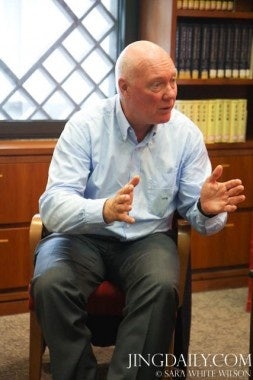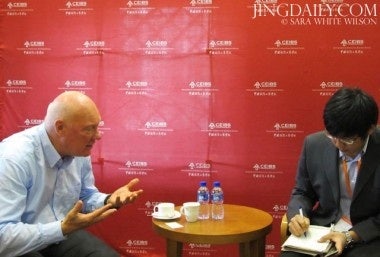Prestige Brands Forum: Jean-Claude Biver On The China Luxury Market#

Jean-Claude Biver, Chairman and CEO of Hublot (Image by Sara White Wilson)
One of the highlights of the Prestige Brands Forum, held this past weekend at the China Europe International Business School in Shanghai, was a Q&A panel with the animated and enthusiastic Jean-Claude Biver, CEO and Chairman of the Swiss watch label, Hublot. A relative latecomer to mainland China, Hublot entered the market approximately 18 months ago, launching strong localized initiatives that included the appointment of Jet Li as the brand's first Asian ambassador and a charity watch collaboration with author Han Han.
Jing Daily sat down with Biver on the sidelines of the forum for a discussion that touched on his plans for tackling the lucrative China market and his thoughts on the current state of luxury there. Transcription and original audio recordings by Jing Daily team.
On luxury and status#
:
Jean-Claude Biver
: The social function of luxury products is a very important one. People use luxury as a communicating tool to others. Luxury bags for women, luxury watches for men, do not only give you the pleasure to own because of the design, the quality, because of the exclusivity, but it gives you additionally the pleasure to show that you are one of the lucky ones who got it and then you have the satisfaction where other people tell you: “Wow, you have it! Where did you get it! Oh, this must cost a lot! Ah, are you happy? Show me, show me!”
That makes you so happy! That’s the social role. Now of course, in some countries, mostly in [European] countries like Germany, it is the contrary. People hate the social, so they hide. And I remember in the 80s, a German entrepreneur who every year bought a new Mercedes, every year in the same color, so nobody could see it’s new. So that is an understatement, but very few people are like this. Most people take pleasure in showing and communicating. The social role of luxury items is quite important because luxury is used to communicate, not only to make you happy, but also [for] communication.
On balancing tradition and the future, and managing this fusion:#
Biver:
If we will, one day, go away and connect to the future, and if this future takes the hand made, the skillfulness of fingers, the soul of man away, then we know that’s not for us. So anything in the future, that would avoid us, our part of making by hand is gone. But as long as this future leaves the handmade, in quantity, as it is, we have no problem. If, for instance, tradition is gold, platinum...wow, that’s tradition.
Now if we use carbon, that is totally [futuristic], that of the cars and junk at Formula 1, but if we make the case in gold, or if we make the case in carbon, the hand-made parts are the same. It’s just that gold is tradition and carbon is the future. So carbon, we say, “yes, carbon, you can come,” and we make carbon. This is a carbon watch, a minute repeater. This is the most [traditional] movement, the minute repeater, but it’s in a carbon case. But the carbon case needs to be as hand-made as a gold case, eventually even more. So our limit is always the soul, we accept any future, provided it doesn't kill our soul. If the future says [to] me, “Hey, use this, you will not need any more people,” or instead of ten watchmakers, you need only six, then the future is not good for me because it destroys my hand-made [craftsmanship], my tradition.
Jing Daily (JD): How does the Chinese consumer market fit into Hublot's ideals of fusing tradition with future? How would you describe Chinese tastes in luxury?#
Biver:
High, very high segment. There is no nationality anymore. A rich Middle-Easterner, a rich Saudi, likes the same Mercedes as the rich German, who likes the same Mercedes as the rich American who like the same Mercedes as the rich Chinese. When it comes to a little car, cheap car, then it might be different. You have different tastes, but at top level, same Audi everywhere, same Porsche everywhere, same Ferrari everywhere, so there are no difference. Difference is when you go medium-price level or low-price level. There you have the different taste, different habits, different ..you know. But in the up, up, up segment: one taste.

Jean-Claude Biver with Jing Daily correspondent, Rex Jiang
JD: So, after being in China, would you still say that China offers "at least 30 years of growth?" What have you discovered about the watch market in China and what’s coming up for Hublot in 2011?#
Biver:
So China is not 30 years of growth, China is a hundred years of growth. I mean, thirty years of growth, that’s too limited. Maybe Europe is 30 years of growth, but not China. The day China stops growing, the world goes under.
So no growth for China, the world is gone. Finished.
So I’m not expecting only 30 years of growth in China, I’m expecting much more. But in thirty years, I will die, so that is my problem. [Chuckles] I will not see over 30 years. You know, I’m 62, I die at 92, maybe I die at 96, but I will not see much more than 30 years. So China is, for me, nearly eternal. It’s just starting, I would even say. We are in stage one.
The second question, what is particular, you said, in China...
JD: Yes, about the watch market.#
Biver:
Yes, the watch market. What is particular in China is, still for the moment, many people need to be reassured that what they buy is right. And therefore, they need to know who is wearing [what], if you have important celebrities or personalities from the government who are wearing your watch or driving the car. That helps a lot in China because it makes the Chinese...gives them security that what they buy is right because "he also has one." In many other countries, this element is less important because people have self-confidence and they buy even if not everybody has one.
So what is special in China, the proportion of people who buy because they have seen on others is still quite important. That is, I think, the major difference. You see now, more and more, in South America, America, Europe, where people say, “I want something that nobody has! No, I don’t want the watch that, in Hollywood, everybody has one like this. I want different.”
This trend, starting now in those countries, where people want uniqueness, in China, is not so strong yet. It’s still, very much, to have the same as some celebrity or other people have.
JD: What are the top trends you see for 2011, either in watchmaking or in general luxury?#
Biver:
I see...I will stay on watchmaking because that is the only thing I know, I see in watchmaking, in the top, top, top, top end, a trend to ultra-light. Watches with no weight. Ultra-light. The lightest possible, 20 gram, 30 gram. The watch [you] cannot feel. The watch where in the beginning when you wear it, every ten seconds, every ten minutes you think you have lost it because you cannot feel it, it’s so light.
I see also a trend in new materials. New high-tech materials that [are] not only ultra-light, also give birth to new colors. Not only yellow like gold, or white like white gold, or platinum or steel. So I see a double trend, on one side, [one] in the direction of super super light, and the other one, watches in new materials that are linked to technology, to the future.
Come back tomorrow for Part Two of our interview with Jean-Claude Biver, which looks into Hublot's entry into China, marketing strategy, partnerships with Jet Li and Han Han, and interest in Corporate Social Responsibility.#
Special thanks to Charmaine Clarke, from CEIBS Marketing & Communications.